高考英语一轮复习Module3TheViolenceofNature学案含解析外研版必修3
2024高考英语一轮总复习必修3Module3TheViolenceofNature学案含解析外研版

Module3 TheViolenceofNature(主题语境:人与自然——灾难防范)核心考点课堂突破1.experiencevt.经验n.阅历;经验[高考佳句](2024·天津卷)During the coming-of-age ceremony,the headmaster congratulated us on stepping into the adult,reviewing the growth period that we had experienced.在成年礼上,校长庆贺我们步入成人,回顾了我们的成长历程。
语境巧练[用所给词的适当形式填空]①Anyone wishing to try race walking should probably first consult a coach or (experience) racer to learn proper technique.②What I saw was completely unlike anything I (experience) in the past.③If you come to visit China,you (experience) a culture of amazing depth and variety.考点必记(1)have experience in=be experienced at有……阅历from/by experience凭阅历;从阅历中full of experience阅历丰富get/gain experience获得阅历(2)inexperience n.缺乏阅历;无阅历experienced adj.有阅历的inexperienced adj.没有阅历的[名师点津]experience用作名词,表示“阅历;体验”时,是不行数名词;表示“经验;感受”时,通常是可数名词。
2.occurv.发生;存在于,出现在;(想法)产生(过去式和过去分词都是occurred)[教材原句]Almost all of them occur in the US,in the area from Texas in the southeast to South Dakota in the north.(P23)几乎全部的龙卷风都发生在美国,从东南部的得克萨斯州到北部的南达科他州。
高一英语外研版3学案:Module3TheViolenceofNatureSectionⅠ含解析
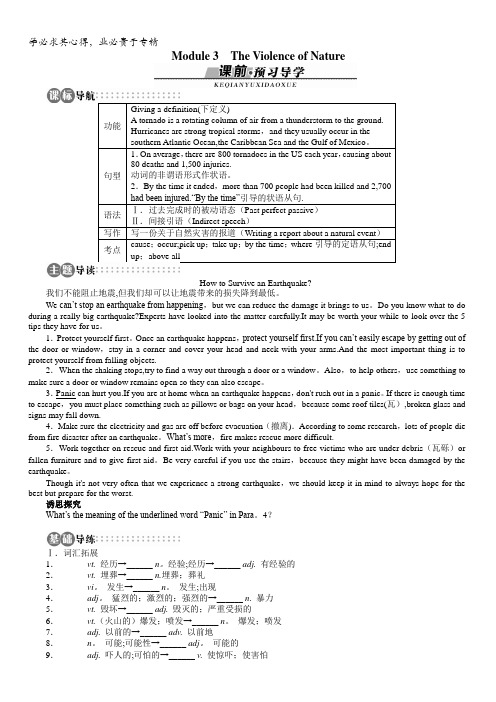
Module 3The Violence of Natureup ;above allHow to Survive an Earthquake?我们不能阻止地震,但我们却可以让地震带来的损失降到最低。
We can’t stop an earthquake from happening ,but we can reduce the damage it brings to us 。
Do you know what to do during a really big earthquake?Experts have looked into the matter carefully.It may be worth your while to look over the 5 tips they have for us 。
1.Protect yourself first 。
Once an earthquake happens ,protect yourself first.If you can’t easily escape by getting out of the door or window ,stay in a corner and cover your head and neck with your arms.And the most important thing is to protect yourself from falling objects.2.When the shaking stops,try to find a way out through a door or a window 。
Also ,to help others ,use something to make sure a door or window remains open so they can also escape 。
外研高中英语教案module 3 the violence of nature word含答案
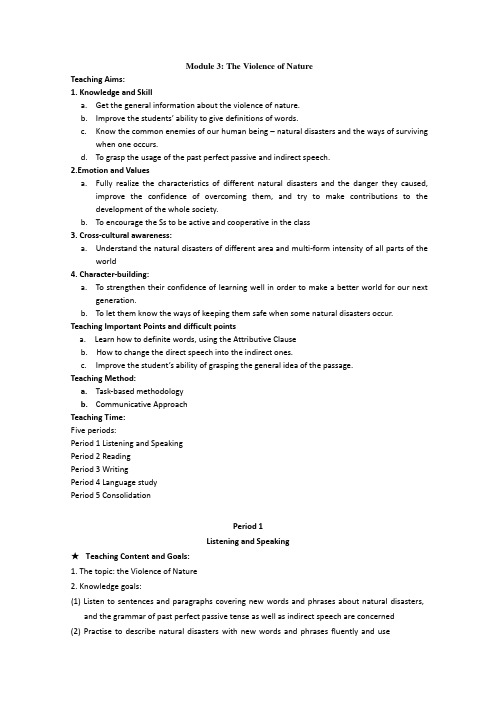
Module 3: The Violence of NatureTeaching Aims:1. Knowledge and Skilla.Get the general information about the violence of nature.b.Improve the students’ ability to give definitions of words.c.Know the common enemies of our human being – natural disasters and the ways of survivingwhen one occurs.d.To grasp the usage of the past perfect passive and indirect speech.2.Emotion and Valuesa.Fully realize the characteristics of different natural disasters and the danger they caused,improve the confidence of overcoming them, and try to make contributions to the development of the whole society.b.To encourage the Ss to be active and cooperative in the class3. Cross-cultural awareness:a.Understand the natural disasters of different area and multi-form intensity of all parts of theworld4. Character-building:a.To strengthen their confidence of learning well in order to make a better world for our nextgeneration.b.To let them know the ways of keeping them safe when some natural disasters occur. Teaching Important Points and difficult pointsa. Learn how to definite words, using the Attributive Clauseb. How to change the direct speech into the indirect ones.c.Improve the student’s ability of grasping the general idea of the passage.Teaching Method:a.Task-based methodologymunicative ApproachTeaching Time:Five periods:Period 1 Listening and SpeakingPeriod 2 ReadingPeriod 3 WritingPeriod 4 Language studyPeriod 5 ConsolidationPeriod 1Listening and Speaking★Teaching Content and Goals:1. The topic: the Violence of Nature2. Knowledge goals:(1) Listen to sentences and paragraphs covering new words and phrases about natural disasters,and the grammar of past perfect passive tense as well as indirect speech are concerned(2) Practise to describe natural disasters with new words and phrases fluently and usepast perfect passive tense and indirect speech if it is necessary3. Teaching goals:Students are able to write and talk about a natural disaster★Teaching Important Points and Teaching Difficult Points:1. Teaching important points:Pronunciation of new words; Talk about the natural disasters in theworld.2. Teaching difficult points:To describe a natural disaster you have experienced.★Teaching Methods and Approach:1. Teaching methods:Student-centered interactive classroom; communicative and heuristicteaching method2. Teaching approach: the use of multimedia teaching approach★Teaching procedures:Step 1: Warming up (5 minutes)1 Remind the students of the tsunami in 2004 with a picture and talk about it.2 Ask the students to talk about it, such as Sri Lanka , Indonesia , Thailand , India, Malaysia and East Africa destroyed by the monster waves, causing millions of deaths.3 Ask the students to talk about the pictures in the Introduction, page 21.Step 2: Lead-in (part 1, page 21) (5 minutes)Get students to match the words in the box with the definitions below. Then ask individuals to show their answers.Step 3: Discussion (5 minutes)1. Put the students into groups of four to discuss the questions.2. Then open up the discussion to the whole class. Make notes on the board, especially of relevantvocabulary which may be new.Step 4: Words study (Workbook Page 80) (5 minutes)Ask the students to turn to Page 80 and begin the task in vocabulary. (Exercise 5)Choose one student to read out the answers and check them with the whole class. Then the students read the sentences together.Answers: volcano, eruption, ash, lava, tidal wave, flood.Step 5: Practice of speaking (10 minutes)1. Personal Experience: Ask the students to talk about their personal experience onnatural disasters and share the experience with each other.2. Role-Play: Ask the students to work in pairs and make a dialogue as a reporter and asurvivor; the content of the dialogue should cover the questions as “What hashappened? When did it happen and how long did it last? How did you survive it? etc.”Step 6: Listening and Vocabulary(10 minutes)1. Ask the students to turn to Page 25 and complete the first part.2. Try to finish the Part Three.3. Listen to a paragraph and underline the words which the speaker stresses.Step7: Summary (4 minutes)Every student is asked to think about what he learns in the period and tell what he learnsto his partner.Step8: Homework(1 minute)1. Read the “Everyday English ” part in the Power Point and get familiar with the adverbs.2. Surf the Internet for ways to avoid much damage from disasters.3. Make three sentences to define the words earthquake, volcanic eruption,and plane crash,using the Attributive Clause.Period 2Reading★Teaching Content and Goals:1. The topic: the Violence of Nature2. Knowledge goals: Read the text with new words and phrases, as well as sentences with past perfect passive tense and indirect speech; get the information about different kinds of disasters and have a good understanding about them.3. Teaching goals:Students are able to●read about the Gulf Stream and check the meaning of the words.●know what a Tornado is without looking at their books.●talk about something about a Hurricane.●learn some words like tropical, occur, disaster and so on by heart by finding them and matchthem with the definitions.★Teaching Important Points and Teaching Difficult Points:1. Teaching important points: Read and get certain information about what a tornado is; what ahurricane is, and an extraordinary event2. Teaching difficult points: How to help students improve their reading ability?★Teaching Methods and Approach:1. Teaching methods:Student-centered interactive classroom; communicative and heuristicteaching method2. Teaching approach: the use of multimedia teaching approach★Teaching procedures:Step 1: Revision (4 minutes)Ask three or four students to read the word list and ask other students to correct their wrong pronunciations.Step 2:Work in pairs on a special report about disasters and interview some students. (5 minutes)Questions may like these:1 Have you ever experienced (a flood, a tornado a thunderstorm, a hurricane)?2 Do you know anyone who has experienced one of the events?3 Have you ever read a news story about one of the events? Can you describe it?4 Do you know anything about the events? For example, what causes them?Step 3: Read about the Gulf Stream and check the meaning of the words on Page 22. (5 minutes) Step 4: Skimming (3 minutes)Skim the three articles on Page 23 and match the article with its main idea.Step 5: Scanning (7 minutes)Scan the three articles and then answer the questions on the Power Point.Step 6: reading(10 minutes)Step7:Find the words and expressions in the passages and match them with the definitions. (6 minutes)Step8: Summary (4 minutes)Summarize the information what we have learned about the natural disasters in the articles together.Step 9: Homework (1 minute)1.Collect more information on Internet about one of the disasters (for examples: hurricane;tornado; thunderstorm; volcanic; eruption; earthquake tsunami flood).2.Read it and have a good understanding about it.Period 3Writing★Teaching Content and Goals:1. The topic: the Violence of Nature2. Knowledge goals:write essays with the words and grammar points we have learned; complete the requested practices in the book and be able to compare the differences between different natural disasters in different areas.3. Teaching goals:Students are able to write essays proficiently with what we have learned in the class.★Teaching Important Points and Teaching Difficult Points:1. Teaching important points:Language Points2. Teaching difficult points:How to make an essay coherent?★Teaching Methods and Approach:1.Teaching methods:Student-centered interactive classroom; communicative and heuristicteaching method2. Teaching approach: the use of multimedia teaching approach★Teaching procedures:Step 1: Brainstorming (5 minutes)Step 2: Read the passage aloud. (2 minutes)Step 3: Complete the exercise on Power Point by yourselves (3 minutes)Step 4: Topical Writing (34 minutes)1. Volcano (17 minutes)(1) Language points about volcano(2) Exercises on writing an essay about volcano2. Earthquake (17 minutes)(1) Language points about earthquake(2) Exercises on writing an essay about earthquakeStep 5: Homework (1 minute)●Please surf the Internet or read some related news to collect the information aboutWenchuan Earthquake first.●Then read and organize the information.●And you need to write a report about the earthquake with 150 words.Period 4Language Study★Teaching Content and Goals:1. The topic: the Violence of Nature2. Knowledge goals:Learn the grammar of past perfect passive tense and indirect speech; learn about new words and their usage.3. Teaching goals:Students are able to use new words and the grammar of past perfect passive tense as well as indirect speech proficiently.★Teaching Important Points and Teaching Difficult Points:1. Teaching important points:Language Points2. Teaching difficult points: the grammar of past perfect passive tense★Teaching Methods and Approach:1.Teaching methods:Student-centered interactive classroom; communicative and heuristic teaching method2. Teaching approach: the use of multimedia teaching approach★Teaching procedures:Step 1: the grammar of the past perfect passive (17minutes)(1)Introduction of the past perfect passive(2)Related exercises on Page 24Step 2: the grammar of indirect speech (17minutes)(1) Introduction of the indirect speech(2) Related exercises on Page 26Step 3: Words (10 minutes)(1) Introduction of the new words (e.g. rotate ;violent; occur; pick up; take off; on average)(2) Instruction of the usageStep 4: Homework (1 minute)1. Be familiar with the grammar☆ the past perfect passive☆ the indirect speech2. Be familiar with the wordsPeriod 5Consolidation★Teaching Content and Goals:1. The topic: the Violence of Nature2. Knowledge goals: Review the language points we have learned3. Teaching goals:Students are able to describe natural disasters proficiently, and master the grammar of past perfect passive and indirect speech.★Teaching Important Points and Teaching Difficult Points:1. Teaching important points:Language Points2. Teaching difficult points:the communicative ability and the grammar points★Teaching Methods and Approach:1.Teaching methods:Student-centered interactive classroom; communicative and heuristic teaching method2. Teaching approach: the use of multimedia teaching approach★Teaching procedures:Step 1:Guessing the meaning of “take off” (5 minutes)Step 2: Translating the sentences (5 minutes)Step 3: Multiple choice (8 minutes)Step 4: Fill in the blanks with proper phrases (6 minutes)Step 5: Word spelling (5 minutes)Step 6: Fill in the blanks with proper words (5 minutes)Step 7: Grammar exercises (10 minutes)Step 8: Homework (1 minute)●Make a list of what we have learned in this unit including the new words and the grammarpoints.●Write an essay about a natural disaster in 150 words.。
2017届高三英语外研版 必修三一轮复习案_Module3 The
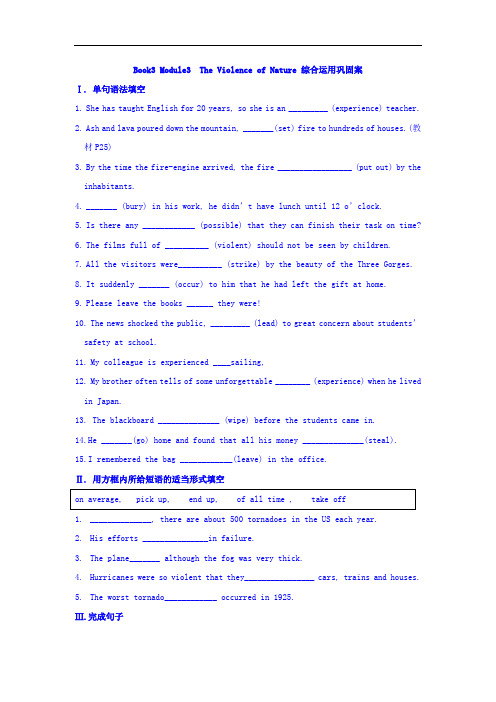
Book3 Module3 The Violence of Nature 综合运用巩固案Ⅰ.单句语法填空1.She has taught English for 20 years, so she is an _________ (experience) teacher.2.Ash and lava poured down the mountain, _______(set) fire to hundreds of houses.(教材P25)3.By the time the fire-engine arrived, the fire _________________ (put out) by theinhabitants.4._______ (bury) in his work, he didn’t have lunch until 12 o’clock.5.Is there any ____________ (possible) that they can finish their task on time?6.The films full of __________ (violent) should not be seen by children.7.All the visitors were__________ (strike) by the beauty of the Three Gorges.8.It suddenly _______ (occur) to him that he had left the gift at home.9.Please leave the books ______ they were!10.The news shocked the public, _________ (lead) to great concern about students’safety at school.11.My colleague is experienced ____sailing,12.My brother often tells of some unforgettable ________ (experience) when he livedin Japan.13. The blackboard ______________ (wipe) before the students came in.14.He _______(go) home and found that all his money ______________(steal).15.I remembered the bag ____________(leave) in the office.Ⅱ. 用方框内所给短语的适当形式填空1.______________, there are about 500 tornadoes in the US each year.2.His efforts _______________in failure.3.The plane_______ although the fog was very thick.4.Hurricanes were so violent that they________________ cars, trains and houses.5.The worst tornado____________ occurred in 1925.Ⅲ.完成句子1. He left the books ________________________.他把书放到了原来的地方。
2020版高考英语一轮复习第1部分Module3TheViolenceofNature教学案(含解析)外研版
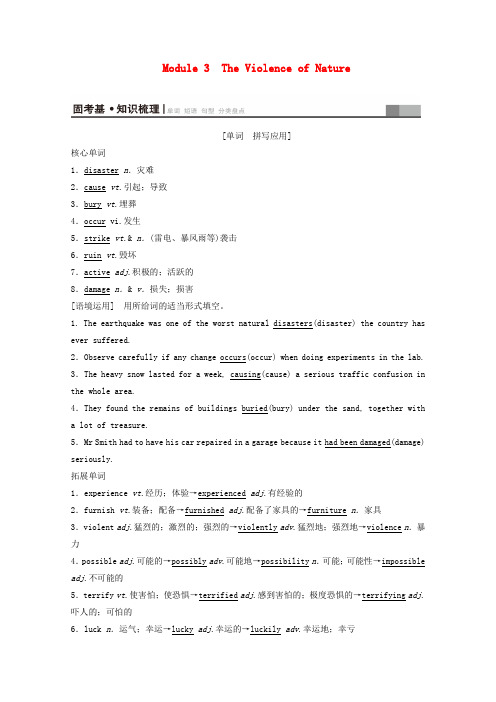
Module 3 The Violence of Nature[单词拼写应用]核心单词1.disaster n.灾难2.cause vt.引起;导致3.bury vt.埋葬4.occur vi.发生5.strike vt.& n.(雷电、暴风雨等)袭击6.ruin vt.毁坏7.active adj.积极的;活跃的8.damage n.& v.损失;损害[语境运用] 用所给词的适当形式填空。
1. The earthquake was one of the worst natural disasters(disaster) the country has ever suffered.2.Observe carefully if any change occurs(occur) when doing experiments in the lab. 3.The heavy snow lasted for a week, causing(cause) a serious traffic confusion in the whole area.4.They found the remains of buildings buried(bury) under the sand, together with a lot of treasure.5.Mr Smith had to have his car repaired in a garage because it had been damaged(damage) seriously.拓展单词1.experience vt.经历;体验→experienced adj.有经验的2.furnish vt.装备;配备→furnished adj.配备了家具的→furniture n.家具3.violent adj.猛烈的;激烈的;强烈的→violently adv.猛烈地;强烈地→violence n.暴力4.possible adj.可能的→possibly adv.可能地→possibility n.可能;可能性→impossible adj.不可能的5.terrify vt.使害怕;使恐惧→terrified adj.感到害怕的;极度恐惧的→terrifying adj.吓人的;可怕的6.luck n.运气;幸运→lucky adj.幸运的→luckily adv.幸运地;幸亏7.hope v.& n.希望;期望→hopeful adj.有希望的→hopefully adv.满怀希望地;有希望地8.sad adj.伤心的→sadly adv.伤心地;不幸地→sadness n.悲伤9.fortune n.运气;财富→fortunate adj.幸运的→fortunately adv.幸运地;幸亏10.warn v.警告→warning n.警告[语境运用] 用所给词的适当形式填空。
高考英语一轮复习Module3TheViolenceofNature练习含解析外研版必修3
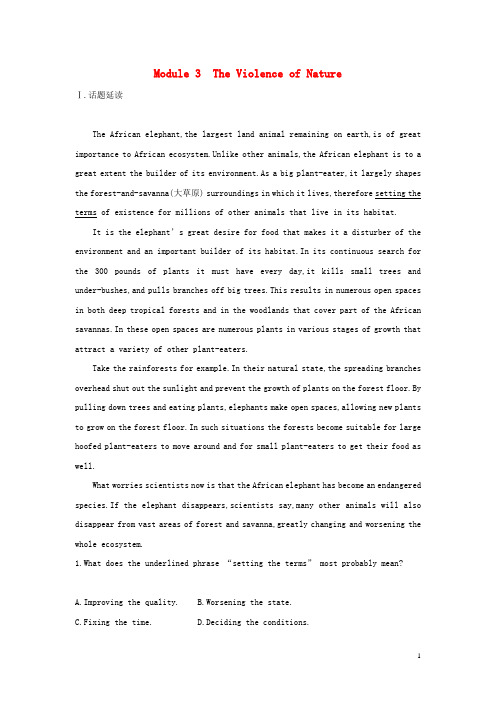
Module 3 The Violence of NatureⅠ.话题延读The African elephant,the largest land animal remaining on earth,is of great importance to African ecosystem.Unlike other animals,the African elephant is to a great extent the builder of its environment.As a big plant-eater,it largely shapes the forest-and-savanna(大草原) surroundings in which it lives,therefore setting the terms of existence for millions of other animals that live in its habitat.It is the elephant’s great desire for food that makes it a disturber of the environment and an important builder of its habitat.In its continuous search for the 300 pounds of plants it must have every day,it kills small trees and under-bushes,and pulls branches off big trees.This results in numerous open spaces in both deep tropical forests and in the woodlands that cover part of the African savannas.In these open spaces are numerous plants in various stages of growth that attract a variety of other plant-eaters.Take the rainforests for example.In their natural state,the spreading branches overhead shut out the sunlight and prevent the growth of plants on the forest floor.By pulling down trees and eating plants,elephants make open spaces,allowing new plants to grow on the forest floor.In such situations the forests become suitable for large hoofed plant-eaters to move around and for small plant-eaters to get their food as well.What worries scientists now is that the African elephant has become an endangered species.If the elephant disappears,scientists say,many other animals will also disappear from vast areas of forest and savanna,greatly changing and worsening the whole ecosystem.1.What does the underlined phrase “setting the terms” most probably mean?A.Improving the quality.B.Worsening the state.C.Fixing the time.D.Deciding the conditions.2.The passage is developed mainly by .A.showing the effect and then explaining the causesB.giving examplesC.pointing out similarities and differencesD.describing the changes in time order3.What is the passage mainly about?A.Forests and savannas as habitats for African elephants.B.The eating habit of African elephants.C.Disappearance of African elephants.D.The effect of African elephants’ search for food.4.What do we know about the open spaces in the passage?A.They are home to many endangered animals.B.They result from the destruction of rainforests.C.They are attractive to plant-eating animals of different kinds.D.They provide food mainly for African elephants.语篇解读:本文是一篇说明文。
外研2021高考一轮Book3Module3TheViolenceofNature学案英语解析
1.A severe earthquake almost destroyed everything, leaving many buildings in ruins.一场强烈的地震几乎毁了一切,令很多建筑成为废墟。
2.Crops are destroyed in a flood, which gradually results in increased food prices due to food shortages.洪水毁坏了农作物,这逐渐导致由食物短缺引起的食品价格上涨。
3.California wildfires caused a lot of homes and other buildings to burn to ashes and many people were reported killed, making it the deadliest in state's recorded history.加州山火令很多房屋和建筑烧为灰烬,据报道很多人在火中丧生,使得它成为该州有史以来最致命的山火。
4.There is the possibility of lifethreatening floods during the next 48 hours in many coastal areas.在沿海地区未来48小时内有可能会出现危及生命的洪灾天气。
自主排查夯基固本Ⅰ 核心单词(1)flood (n.) 洪水(2)experience (vt.) 经历(n.) 经历(可数);经验(不可数)→experienced (adj.) 有经验的(3)cause (vt.) 引起;导致(n.) 原因;事业;目标(4)furniture (n.) 家具→furnish (vt.) 配备;装备(5)bury (vt.) 埋葬→burial (n.) 葬礼;掩埋(6)occur (vi.) 发生→occurrence (n.) 发生;出现(7)violent (adj.) 猛烈的;激烈的;强烈的→violence (n.) 暴力(8)strike (vt.& n.) (雷电、暴风雨等)袭击(n.) 罢工→struck (过去式)→struck/stricken (过去分词)(9)possibility (n.) 可能;可能性→possible (adj.) 可能的→possibly (adv.) 可能地(10)terrifying (adj.) 吓人的;可怕的→terrified (adj.) 恐惧的;受惊吓的→terrify (vt.) 使恐惧;惊吓→terror (n.) 恐惧;惊恐(11)luckily (adv.) 幸运地;幸亏→lucky (adj.) 幸运的→luck (n.) 好运;运气(12)thankfully (adv.) 感激地;满怀感谢地→thankful (adj.) 感激的;感谢的→thank (v.) 感谢(13)hopefully (adv.) 满怀希望地;有希望地→hopeful (adj.) 有希望的→hope (n. & v.) 希望;期望(14)sadly (adv.) 伤心地;不幸地→sad (adj.) 悲伤的→sadness (n.) 悲伤(15)warning (n.) 警告→warn (v.) 警告(16)active (adj.) 积极的;活跃的→actively (adv.) 积极地;活跃地(17)damage (n.& v.) 损失;损害Ⅱ 阅读单词(1)disaster (n.) 灾难(2)hurricane (n.) 飓风(3)lightning (n.) 闪电→light (n.) 光(v.) 点燃(4)thunderstorm (n.) 雷暴(5)tornado (n.) 龙卷风(6)column (n.) 柱状物(7)current (n.) 海流;潮流(8)latitude (n.) 纬度(9)feather (n.) 羽毛(10)tropical (adj.) 热带的(11)equator (n.) 赤道(12)rotating (adj.) 旋转的;循环的(13)wave (n.) 波浪(14)erupt (vt.) (火山的)爆发;喷发→eruption (n.) 爆发;喷发(15)volcano (n.) 火山(16)previous (adj.) 以前的→previously (adv.) 以前地(17)worldwide (adj.) 全世界的 [单句语法填空]1.The young man has not yet recovered from his early ________ (experience).答案:experiences2.I was looking for my handbag, which ________ (bury) under a pile of old newspapers.答案:was buried3.An earthquake hit the capital, ________ (cause) panic among the population.答案:causing4.The explosion ________ (occur) during an exercise near the town.答案:occurred5.Immediately a great fear fell on her. She shut the door ________ (violent), and ran away.答案:violently6.Wilde fell and ________ (strike) his head on the stone floor.答案:struck7.Then a lake formed, probably after an ________ (erupt) blocked some rivers or streams.答案:eruption8.We were not in the least worried about the ________ (possible) that sweets could rot theteeth.答案:possibility9.The biting cold was more ________ (terrify) than anyone could have imagined.答案:terrifying10.________ (hopeful), you've found Franklin's and the others' advice helpful.答案:Hopefully自然灾害词汇集锦①flood洪水②earthquake地震③drought干旱④aftershock 余震⑤tsunami 海啸⑥mudslide 泥石流⑦landslide 山体滑坡⑧haze 霾1.pick_up 捡起;接收(信号);卷起;掀起;搭载;偶然学会2.take_off 去掉;起飞;突然成功;脱掉3.on_average 平均起来4.end_up 结果为……,以……结束5.wake_up 睡醒;醒来6.set fire to 放火(焚烧)……7.catch fire 着火8.put out 扑灭(火)9.in all 总共;共计10.take place 发生;举行 [选词填空]pick up, put out, in all, on average, end up with, set fire to1.There were twelve of us ________ for dinner.答案:in all2.You can ________ what astronauts call a carbon-dioxide headache.答案:end up with3.The boy went down to ________ the wallet on the ground.答案:pick up4.The police were trying to find out who ________ the shop.答案:set fire to5.The price of the egg is eight yuan per kg________.答案:on average6.Without firemen, the villagers around tried many ways to ________the fire.答案:put out1.pick 短语小结①pick up 捡起;学会;接收(信号)②pick off 瞄准射击;采摘;挑选③pick on 捉弄;欺负;挑剔;批评④pick out 挑出,辨认出⑤pick at 吃一点点;扯;找茬2.“fire”家族①set fire to ... 放火烧……②catch fire 着火③be on fire 着火;在燃烧④start a fire 生火,点火⑤make a fire 生火⑥put out a/the fire 灭火⑦play with fire 玩火⑧open fire (战争等)开火⑨be on fire for ... 对……狂热/喜欢课文原句句式梳理仿写训练1.On average, there are 800tornadoes in the US each year, causing about 80 deaths and 1,500 injuries. (P 23)美国每年平均会发生800次龙卷风,造成大约80人死亡,1,500人受伤。
高考英语一轮复习Module3TheViolenceofNature课后练习含解析外研版必修
Module 3 The Violence of Nature课后双卷·练透提能得分点A卷单元语基巩固卷Ⅰ.单句语法填空1.I still don't know what caused the computer to crash (crash).2.The professor referred to his experiences (experience)abroad when he gave us a talk.3.Struck/Stricken (strike) by the mudslide,the town was cut off from the outside.4.Some people tried many ways to lose weight,ending up gaining (gain) weight soon again.5.They found the remains of buildings buried (bury) under the sand,together with a lot of treasure.6.An idea occurred to me that I should turn to my former teacher for help.7.She picked up Spanish while she was living in Mexico.8.She must have left the handbag where she often has a date with her boyfriend.9.After the earthquake I saw the whole town in ruins,but now everything has changed.10.The government has issued a warning that the fish may not be fit to eat.Ⅱ.选词填空The factory 1.caught fire last week.Although it was 2.put out by the firefighters,3.plenty of losses have been brought about.The police suspected that someone 4.set fire to it.After making some investigations,it was found that a burning cigarette caused the fire.Of course,the man concerned was to blame for it,and 5.ended up in prison.take off; take place; in allGreat changes have 6.taken place in our school since 2019.There are 3,000 students 7.in all in our school,almost half of whom are admitted into keyuniversities.Therefore,every time we refer to our school,we can't help feeling proud of it.I wish everyone of our school could 8.take off in the following year.Ⅲ.完成句子1.我突然想到我们可以去征求老师的建议。
高考英语一轮复习 Module3 TheViolenceofNature教学案 外研版必修3
Module 3 The Violence of Nature1.____________ vt.经历→____________ adj.有经验的2.____________ adj.猛烈的;激烈的;强烈的→____________ n.暴力→____________ adv.猛烈地;激烈地3.____________ n.可能;可能性→____________ adj.可能的→____________ adv.可能地4.____________ adj.吓人的;可怕的→____________ adj.害怕的→____________ vt.使害怕5.____________ adv.幸运地;幸亏→____________ adj.幸运的→____________ n.运气;好运6.____________ adv.感激地;满怀感谢地→______________ vt.感谢7.____________ adv.满怀希望地;有希望地→____________ vt.希望8.____________ adv.伤心地;不幸地→____________ adj.悲伤的→____________ n.悲伤9.____________ n.警告→____________ vt.警告10.____________ adj.积极的;活跃的→____________ n.活动1.The accident did a lot of ____________(损害)to the car.2.The government has issued a ____________(警告)that the fish may not be fit to eat.3.The earthquake was one of the worst natural __________(灾难)the country has ever suffered.4.It was 30 years before he told anyone of his ____________(可怕的)experience.5.Do you have any ____________(以前的)experience of this type of work?6.I helped him choose the ____________(家具)for his new house.7.Students were involved in ______(激烈的)clashes with the police.8.Strong ___________(水流)can be very dangerous for swimmers.9.There's always a ____________(可能性)that he might go back to Seattle.10.Children need to ____________(经历)things for themselves in order to learn from them.1.____________卷起;掀起;拿起;捡起2.____________记下;放下3.____________去掉4.____________平均起来;一般说来5.____________以……结束/告终6.____________放火(焚烧)……7.____________着火8.____________扑灭(火)9.____________发生10.____________总共;总计1.They can destroy houses,but leave the furniture inside exactly ______________.它们能毁掉房子,却把房内的家具留在原处。
外研版必修三Module 3《The Violence of Nature》word学案(有答案)
Book ⅢModule 3 The Violence of NaturePeriodⅠMar.Ⅰ. Introduction1. Do exercise 1 on page212. Translate the words and phrases into Chinese.(1)一道闪电(2)经历一场洪灾(3)指的是,查阅(4)灾难(5)飓风(6)龙卷风Ⅱ. Reading and vocabulary1. Do exercise 2 on page 222. Answer the following questions.(1)Which of the following descriptions about tornado is not correct?A. It is a kind of rotating column of air.B. It is usually caused by a thunderstorm.C. It can reach a speed up to more than 400 kilometres perhour.D. It can cause much damage to people, including deaths and injuries.(2)How much damage did the worst tornado cause to the U. S.?A. It picked up cars, trains and even houses and put them down in the next street.B. The fur of the back of many cats and the feathers of many chickens had been taken off.C. It caused about 80 deaths and 1,500 injuries.D. More than 700 people lost their lives and 2,700 had been injuried.(3)What are the similarities between the tornado and hurricane?A. They both occur together with strong wind.B. America is the country affected often by both of them.C. They both can cause a lot of damage to people and the buildings.D. All above.(4)Where was Charles Coghlan born indeed?A. In Ireland.B. In Canada.C. In New York.D. In Galveston.(5)What are the causes of these natural violences?A. The different atmospheric pressure between two areas.B. The changeable weather in these areas.C. The destroy of the nature by human beings.D. Not mentioned in the passage.3. Try to translate the following expressions into English according to the text.(1)每小时400多千米(2)捡起;拾起(3)放下(4)平均(5)造成约80人死亡(6)热带风暴(7)墨西哥湾(8)有史以来(9)以…结束(10)回到某处(11)有史以来最糟糕的龙卷风发生在1925年,影响了美国的三个州。
- 1、下载文档前请自行甄别文档内容的完整性,平台不提供额外的编辑、内容补充、找答案等附加服务。
- 2、"仅部分预览"的文档,不可在线预览部分如存在完整性等问题,可反馈申请退款(可完整预览的文档不适用该条件!)。
- 3、如文档侵犯您的权益,请联系客服反馈,我们会尽快为您处理(人工客服工作时间:9:00-18:30)。
Module 3 The Violence of Nature(一)课前自主学习Ⅰ.阅读单词——————知其意1.hurricane n.飓风2.lightning n.[纵联1] 闪电3.thunderstorm n. 雷暴4.tornado n. 龙卷风5.current n. 海流;潮流6.feather n. 羽毛7.fur n. (动物的)毛皮8.tropical adj.热带的9.wave n. 波浪10.cemetery n. 墓地;公墓11.ash n. 灰12.volcano n. 火山Ⅱ.重点单词——————写其形1.disaster n. 灾难2.flood n. 洪水3.cause vt.引起;导致4.bury vt.埋葬5.occur vi.[纵联2、3] 发生6.strike vt.& n. (雷电、暴风雨等)袭击7.ruin vt.毁坏8.previous adj.以前的9.worldwide adj.全世界的10.active adj.积极的;活跃的11.damage n.& v.[纵联4] 损失;损害12.earthquake n. 地震Ⅲ.拓展单词——————通其变1.experience vt.经历;体验 n.经历;经验→experienced adj.有经验的2.furniture n.家具→furnish vt.装备;配备3.violent adj.猛烈的;激烈的;强烈的→violence n.暴力→violently adv.猛烈地;激烈地;强烈地4.erupt vt.(火山的)爆发;喷发→eruption n.(火山的)爆发;喷发5.possibility n.可能;可能性→possible adj.可能的→possibly adv.可能地→impossible adj.不可能的6.terrifying adj.吓人的;可怕的→terrified adj.感到害怕的;极度恐惧的→terrify vt.使害怕;使恐惧7.luckily adv.幸运地;幸亏→lucky adj.幸运的→luck n.运气;幸运8.thankfully adv.感激地;满怀感谢地→thankful adj.感激的;感谢的→thank vt.& n.感谢;谢谢[纵联5]9.hopefully adv.满怀希望地;有希望地→hopeful adj.有希望的→hope v.& n.希望;期望10.sadly adv.伤心地;不幸地→sad adj.伤心的→sadness n.悲伤11.fortunately adv.幸运地;幸亏→fortunate adj.幸运的→fortune n.运气;财富12.warning n.警告→warn v.警告纵联1.以ing结尾的名词一览①lightning闪电②warning警告③feeling感觉;感情④greeting问候;致意⑤suffering痛苦;苦难⑥training训练;锻炼纵联2.这些“发生”你可能不知道①occur(偶然)发生②happen(偶然)发生③take place(计划等)发生④break out(灾害、战争等)爆发⑤come about发生;产生(尤指不受控制地)纵联3.词形变换双写“r”①occur/occurred/occurred/occurring②refer/referred/referred/referring③prefer/preferred/preferred/preferring④transfer/transferred/transferred/transferring纵联4.各种“损害”多留意①damage损害②destroy(彻底地)毁坏③ruin(逐渐地)毁坏④harm损害⑤injure损害⑥hurt损害纵联5.后缀ly副词小结①thankfully 感激地②hopefully满怀希望地③bravely勇敢地④quietly安静地⑤similarly相似地⑥fluently流利地⑦truly真正地⑧wholly整体地;完全单元话题——自然灾害子话题1 各种自然灾害①snowstorm n.暴风雪②mudslide n.泥石流③catastrophe n.大灾难;浩劫④tsunami n.海啸⑤drought n.干旱⑥sandstorm n.沙尘暴⑦landslide n.滑坡⑧typhoon n.台风子话题2 自然灾害的影响①destruction n.破坏②melt vi.融化;溶化③release n.& v.释放④severe adj.严重的,剧烈的⑤trap vt.使……陷入困境⑥victim n.受害者;牺牲品⑦muddy adj.泥泞的⑧lava n.火山岩浆⑨terrify vt.使恐惧;惊吓⑩radioactive adj.放射性的[学考对接·活学活用]高考采撷(一) 阅读中的词汇应用1.(2016·北京高考阅读B) On October 29, 2012, that ocean turned fierce❶.That night, Hurricane Sandy attacked the East Coast, and Rockaway was hit especially hard. ❷ (fortunate), Natalie's family escaped to Brooklyn shortly before the city's bridges closed.When they returned to Rockaway the next day, they found their neighborhood in ❸ (ruin).Many of Natalie's friends had lost their homes and were living far away.All around her, people were suffering, especially the elderly.Natalie's school was so ❹ (damage) that she had to temporarily attend a school in Brooklyn.①用本单元中的词汇替换fierce:violent②用fortunate的正确形式填空:Fortunately。
ate为形容词后缀,类似的单词有considerate, desperate等③用ruin的正确形式填空:ruins;常用短语in_ruins表示:严重受损;破败不堪④用damage的正确形式填空:damaged2.(2017·全国卷Ⅰ完形填空) The story began during my first week at college.I watched as the ASL Club performed their translation of a song.Both the hand movementsand the very idea of communicating without speaking attracted❶ me.What I saw was completely unlike anything I ❷ (experience) in the past.This newness just left me wanting more.①用本单元的词汇替换attracted:struck②用experience的正确形式填空:had_experienced。
experience还可用作名词,作“(一次)经历,体验”讲时为可数名词;作“(由实践得来的)经验,阅历”讲时为不可数名词高考采撷(二) 写作中的词汇应用(根据汉语及提示词翻译句子)1.(2018·全国卷Ⅱ书面表达)而且,欢迎你们每个人积极参加这个活动,欣赏这部电影。
(active)What's_more,_everyone_of_you_will_be_welcome_to_take_active_part_in_the_act ivity,_enjoying_the_movie.2.(2018·浙江高考写作)另一方面,我通过在一家旅行社做兼职陪同一些外国游客积累了相关的经验。
(experience)For_another,_I_have_accumulated_related_experience_by_working_parttime_in_ a_travel_agency,_accompanying_some_foreign_tourists.3.(2017·天津高考书面表达)我每天埋头于英文小说,因此我在英语学习上已取得了很大的进步。
(bury)I'm_buried_in_the_English_novels_every_day,_therefore_I_have_made_great_pro gress_in_my_English_study.(二)课堂重点释疑1.experience vt.经历;体验 n.经历;经验[记牢]①(2017·北京高考)After a heated discussion, we agreed on making a video to record our experiences (experience) at school.②(2017·全国卷Ⅲ)As to the activities, we plan to invite experienced (experience) players to give training to us every Friday afternoon.③She has become quite experienced at/in teaching primary school students.④Robert is a worker with much experience, so it will make up for his lack of academic knowledge.[写美] 翻译句子⑤(2018·北京高考书面表达)上周,我们带领着外国学生在我们学校里体验正宗的(authentic)茶文化,结果是非常值得的。
Last_week,_we_took_the_foreign_students_in_our_school_to_experience_the_aut hentic_tea_culture,_which_turned_out_to_be_extremely_rewarding.2.cause vt.引起;导致;使遭受n.原因;事业;目标[记牢]单句语法填空①The poor harvest caused prices to_rise (rise) sharply.②Drunk driving is one of the most common causes (cause) of traffic accidents.补全句子③According to the recent research, heavy coffee drinking and heart attack is not necessarily cause_and_effect.根据最近的调查研究,喝浓咖啡与患心脏病并没有必然的因果关系。
